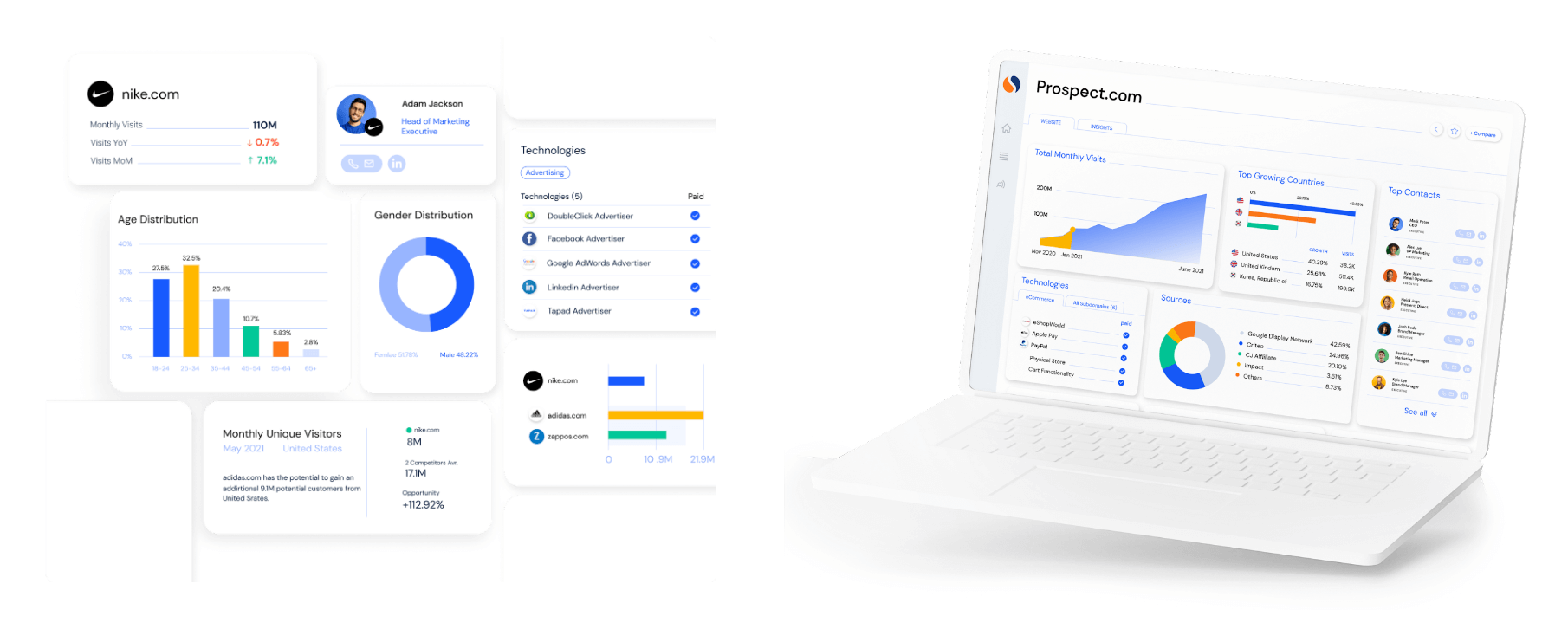Sales Qualification: Questions to Ask Your Prospects

When it comes to sales lead qualification, asking the right questions can – and will – make all the difference. As a salesperson, one of your goals is to identify whether a lead is a good fit for your product or service, and how likely they are to make a purchase through discovery calls.
With the right lead qualification questions, you can quickly determine whether a lead is worth your time, or whether it’s best to move onto the next prospect – for now, at least.
In this blog, we’ll cover some of the best sales qualification questions to ask, so you can work out their worth, maximize your chances of success, and close more (quality) deals.
12 sales qualification questions to ask your prospect
Here are some examples of discovery call questions that SDRs need to ask for effective lead qualification:
1) What are the biggest challenges you’re facing right now?
The fact of the matter is: if there’s no problem, challenge, gap or blindspot, there’s no need to purchase new tools, especially in times of an economic crisis. So, whether you are dealing with an inbound or outbound lead, finding out those pain points is crucial to knowing if your product or service is a good fit.
2) What specific goals are you hoping to achieve as a company?
On top of understanding your prospect’s and specific industry pain points, you want to listen and learn about the goals they want to achieve as a company. Think about where your product or service can fit in to help the prospect get there.
3) How do you measure success?
It’s important to take into account how your prospect measures success, in both qualitative and quantitative ways. They might align perfectly with what your product can offer them as a business, but sometimes, they might not. In this case, it might be time to disqualify them (for the time being at least).
4) Can you tell me more about your current processes, tools and technologies?
Figuring out what your prospect is working with at the moment is another important part of lead qualification. This insight will help you understand how they work, where their shortfalls might be, and gives you an inkling into the integrations you’d need to discuss, as well as potential competitors you’d like to – respectfully – take down.
5) Have you used a similar product to ours in the past?
Here’s where you can use similar products (or at least products with similar qualities), to find out what it was your prospect liked or disliked about it. This prepares you well for positioning your product as the winning solution, setting expectations, and objection handling that might be necessary further down the line.
6) Inbound lead only: What’s prompting you to get in touch now?
For an inbound lead to stumble across your business, they either know what kind of solution they’re looking for or your targeted ads are pretty good. Either way, that doesn’t mean they’re going to be the right kind of client for your product or service.
Finding out their intentions about getting in touch with you, and why your product stood out to them will help you qualify (or disqualify) them, and – if they are qualified – help you tailor your sales pitch to make sure it’s a closed-won kinda deal.
7) What’s an approximate budget you have for this field of work?
Budget can be a tricky topic, but it’s a necessary question when it comes to qualifying leads. If they’ve not got the budget, then they won’t be able to pay for what you’re offering. On top of that, we’re all a bit stingy when it comes to new things – especially in the times we’re in.
That’s where presenting the value of your product comes into it; ask about what they’re currently spending to conceal that problem of theirs, talk about the ROI of your product, and don’t forget to bring up their costs in salaries and integration work for their ‘Franken-stack’.
8) Who else in your organization would be involved in the decision-making process?
All your efforts and your list of questions will go to waste if you’re not speaking to the right person. Finding out the purchase approval process you have to go through will make sure you direct specific questions at the most relevant people, helping to get the best answers for your discovery call, and also build rapport and credibility in the quickest way possible.
9) How do you typically evaluate new products or services? Do you prefer a demo or a free trial?
As well as understanding the decision-making process, find out the best ways to sway their decision and sell the way they like to be sold to. It shows you listen to what they’re saying and asking for, and put their needs ahead of just hitting your sales quota.
10) What would make our product/service a good fit for your business?
Again, this is another question that shows you are (reasonably) flexible to needs and specifications. This will help adapt your sales pitch from beginning to end.
Ask questions around what your prospect’s average day would look like, and how they think your solution would fit into that. Listen, then you can give your two cents with stats and testimonials to prove it.
11) What challenges do you think you’ll come across in the plan I’ve laid out?
Acknowledging that your product might not be perfect is, ironically, a great consultative selling technique. Make your own predictions where they might struggle, but prepare yourself with solutions for those struggles. That right there = the key to objection handling.
“I can see you struggling with X and Y so I’ll make sure you’ve got the right support team on hand, with the right documentation.”
12) Are you looking at other solutions at the moment?
There’s nothing like a bit of healthy competition. Whether your prospect has got one in place already or they’re working with a completely fresh canvas, this is good information to know. You can find out what they like or don’t like about other possible solutions, which will not only help build your sales strategy but also help develop those competitor battlecards.
From SDR to question master
So, what are the benefits of asking all these lead qualification questions? Well, there are actually a bunch, including:
- Helping you to personalize and tailor your comms
- Boosting engagement with your prospect
- Making your product as relevant as possible
- Improving objection handling
- Learning more about your competitors
- Wasting less time with a more efficient lead qualification process
However, you’ll only get those benefits if you actually listen and use the information you’re gathering. And remember…
Good lead qualification gets prospects to answer questions they know the answers to. Great discovery questions help them discover pain points that they weren’t even aware of but realize they need to fix.
However, you need to earn the right to ask questions.
If you prove that you’ve done the research, the work and the listening, your prospect will be more willing to answer questions and go through that sales journey with you. Do what you can to advise your prospect to help achieve their overall goal, with your product being a helpful – preferably, invaluable – feature along the way. That’s what consultative selling is all about.
How Similarweb Sales Intelligence improves your lead qualification process
As a sales intelligence platform, we enable and empower SDRs to perform at their most effective during the lead qualification process.
How exactly? Let’s take a look:
- Our Lead Generator tool ensures that your pipeline is filled with the right kind of prospects, fitting to your ideal customer profile
- With lead scoring mechanisms, you can make sure you’re prioritizing accordingly and disqualifying when needed
- Our customer, industry and competitor data and insights will help grow your knowledge and aid your consultative selling approach
- The Insights Generator tool will give you full transparency into your prospect’s website traffic and performance, so you can determine their pain points and provide a solution to really get their attention
With a sales intelligence tool like Similarweb, you can give your discovery call questions a real boost. With a basis of knowledge about the company you’re calling already, you can make your questions far more targeted to the crux of the matter, and build your credibility as a result.
TL;DR: Similarweb Sales Intelligence optimizes your lead qualification process, helping you create more leads, better leads – and ultimately, more wins.
Keen to find out more about how we can help you and your business specifically? Get in touch today:
FAQs
What does it mean to qualify leads?
To qualify a lead means to make a decision on whether a prospect (inbound or outbound) is right for your company. This includes factors like company size, industry, location, pain points and budget.
How do I know if a prospect is qualified?
A sales prospect is considered to be qualified if they meet certain criteria that determine if they are a good fit for your product or service. It really helps to have an ideal customer profile on hand to work out what kind of companies you’re looking for and qualifying.
What should I do if a prospect doesn’t qualify?
If a prospect doesn’t qualify, it’s best to thank them for their time and move on to other potential leads. However, it’s always a good idea to keep their information on file in case their needs, circumstances or budget changes in the future.
Take your sales strategy to the next level
Try Similarweb Sales Intelligence today — free of charge






![How to Smash Your Next Sales Presentation [15 Tips and Tricks]](https://www.similarweb.com/blog/wp-content/uploads/2021/11/Tips-for-sales-presentations-1-768x456.png)

